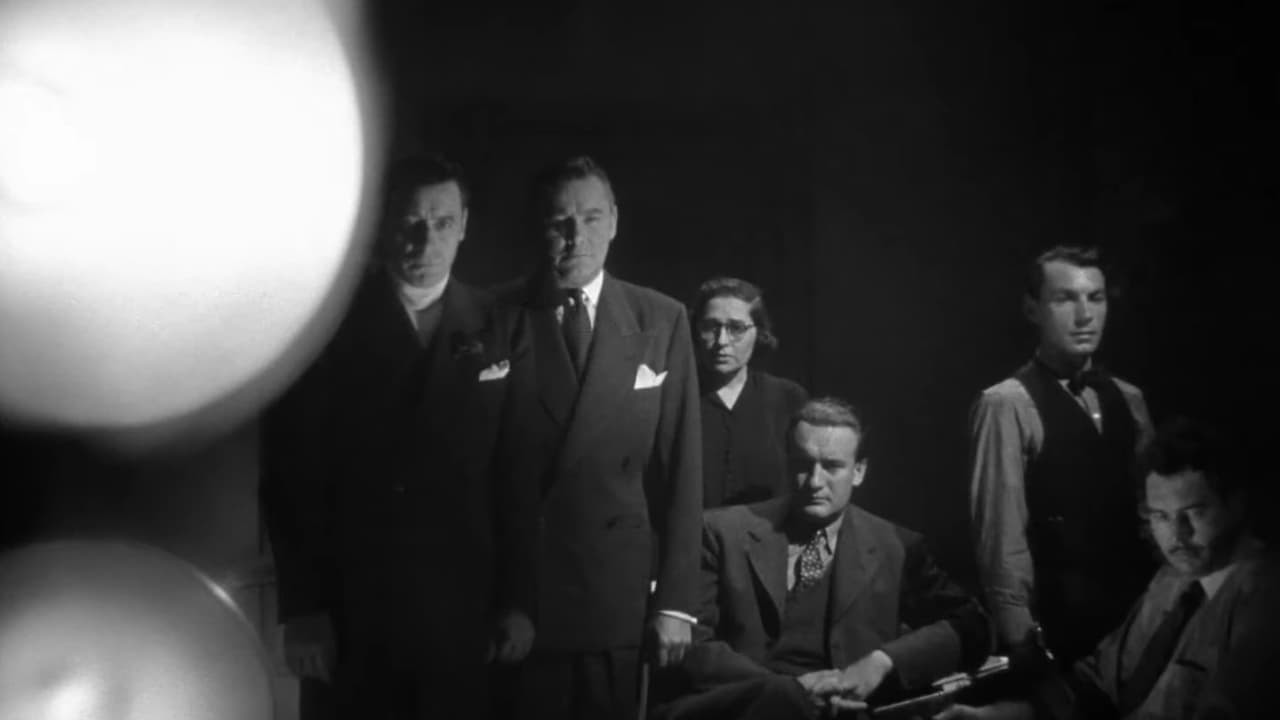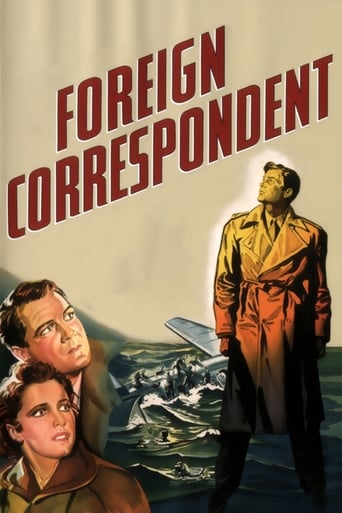

While the cinematography and settings were impressive I found the story to be far too convenient and the "love interest" unbelievable. Every cab, party, room next door and passerby contains someone Jones has met (Latvian fellow funny, so lets throw him in this scene). Assassination, run through umbrellas so well done. Windmill scene stretches credulity as there is no way he wouldn't have been noticed in such a tight space. It was hard to care about kidnapping and the secret since there was no reveal as to. its importance or bearing on the impending war. (and why was airplane flying so low? Well shot as early disaster scenes go though). Still not sure why she was upset about the 2nd room as in 1940 that would seem appropriate, but who knows?
... View MoreExcitement, suspense and humour are just a few of the hallmarks of this high-speed espionage thriller that does such a great job of entertaining from start to finish. With numerous plot twists and dialogue that's sharp and witty, the interest level never drops and no doubt, this contributed to making "Foreign Correspondent" the great commercial and critical success that it eventually became. Over the years, it's become one of Alfred Hitchcock's most under-appreciated films, probably for the simple reason that it's been overshadowed by his numerous great achievements in the years that followed. The fact remains however that, especially for a movie released in 1940, it's technically impressive, full of interesting characters and contains a number of very memorable set pieces.In 1939, Mr Powers (Harry Davenport), the aptly-named editor of the "New York Globe" is utterly exasperated by the lack of hard news that he's getting from his European correspondents about the growing threat of war and so decides to send a crime reporter to find out exactly what's happening. The reporter he chooses for the job is Johnny Jones (Joel McCrea), a young brash and politically naïve character who says "give me an expense account and I'll cover anything". Powers renames his new foreign correspondent, Huntley Haverstock and immediately instructs him to leave for London to attend a conference being held by the Universal Peace Party at which the eminent Dutch diplomat, Van Meer (Albert Bassermann) is due to speak.On his way to the event, Haverstock has the good fortune to meet Van Meer and shares a taxi with him but the old man is totally uninterested in talking about political matters and so doesn't provide Haverstock with any useful information. At the conference, the young American meets Carol Fisher (Laraine Day), the daughter of Stephen Fisher (Herbert Marshall) who's the peace organisation's leader and is shocked when Van Meer doesn't turn up to speak to the audience, apparently because he'd been called to attend another conference in Amsterdam. The determined reporter decides to go to Amsterdam to follow Van Meer's activities and is then drawn into a frantic sequence of events when he witnesses a shocking assassination, gets involved is a car chase and in a windmill in the Dutch countryside, discovers that Van Meer has been kidnapped and drugged by a suspicious-looking group of men.After Van Meer and his captors suddenly disappear, Haverstock returns to London with Carol who he'd met with her friend Scott ffolliott (George Sanders) during the car chase. Haverstock and Carol fall in love and plan to marry but when they return to Carol's home and Haverstock sees one of the men from the windmill with her father, he strongly suspects that Stephen Fisher is a Nazi agent and with the help of ffolliott attempts to rescue Van Meer and expose Fisher as a traitor. The events that follow then put Haverstock in some life-threatening situations before he's eventually in a position to try to get his story back to his newspaper in New York.The way in which the assassination is carried out in this movie is truly shocking and the suspense generated during Haverstock's time in the windmill where he's trying to avoid being seen by Van Meer's captors is tremendous. There's also a brilliantly filmed plane crash which is remarkably realistic as is another tense scene involving a high-level escape from a hotel room.Joel McCrea does well as an ordinary guy who's totally out of his depth in his new job and George Sanders, Laraine Day and Albert Bassermann are all excellent in their supporting roles."Foreign Correspondent" which is overtly anti-Nazi and made a strong appeal for the United States to end its policy of neutrality, made its point so effectively that it even drew great praise from Joseph Goebbels who was the German Minister of Propaganda at the time! Whilst the propaganda content of the film is clearly a reflection of the time in which it was made, its terrific combination of adventure, comedy and romance is so enjoyable that its enduring appeal is guaranteed.
... View MoreAlfred Hitchcock popularized the term "MacGuffin" as being "what the spies are after, but the audience doesn't care." In this movie, the MacGuffin is Clause 27 of a treaty between two countries. It is a secret clause, so secret in fact that it is only known to the two people who signed the treaty, because it was never written down.Now, whether it is a treaty, a contract, or any other kind of agreement, the whole point in writing it down and having people sign it is so that there is no question as to what was agreed to. Anything not written down can be denied later, especially since there are no witnesses to this oral agreement between the two signatories. I guess we are to assume that the two diplomats trust each other so much that an oral agreement and a handshake will suffice.This raises the question as to how anyone other than the two signatories knows of the existence of Clause 27. The spies know about it, as does Scott ffolliott, so I guess the two signatories must have announced that they had signed a treaty with an unwritten clause. It seems to me it would have been better to keep not only the content of the clause a secret, but its existence as well.One of the signatories is Van Meer. To find out what is in Clause 27, the spies kidnap Van Meer with the idea of torturing him until he talks. But to keep the world from knowing that Van Meer has been kidnapped, they get a man who looks like Van Meer to take his place so he can be assassinated. Presumably, the impostor did not know about that part of the plan.If the world thinks Van Meer has been assassinated, then that means that as far as everyone else is concerned, only one person knows what is in Clause 27. Van Meer might have trusted this other fellow, but can we expect the country he represented to honor a secret clause whose content is known only to the diplomat of the other country and take his word for it? So with Van Meer's faked assassination, it would seem that the clause has just become worthless. Or maybe the spies were planning on releasing Van Meer after he spilled his guts saying, "Fooled you. Van Meer is alive after all, but you still have to honor the secret clause that we now know about."Moving right along, if I had been Van Meer and the spies started torturing me to tell what was in Clause 27, I would have just made up something. After all, it's a secret, so how would the spies have known the difference?But enough of this. The point of the MacGuffin, as noted above, is to give the spies something to pursue that the audience is not expected to care about. But that's just the problem. Maybe we are not supposed to care about what the MacGuffin is, but we sure are supposed to care about what makes the MacGuffin important. Over and over again, we are continually being prodded with a preachy message about the need to take a strong stand against Germany. In short, this is another of Hitchcock's propaganda films, the first one being "The Lady Vanishes" (1938). This is why Stephen Fisher, who is the leader of the Universal Peace Party, a pacifist organization, actually turns out to be a Nazi spy. You can't trust those peaceniks. The problem is not with the message per se, but with the enervating effect of propaganda. Who wants to watch a movie and be lectured to? Of course, there are enough good scenes in the movie, especially the one in the windmill, to make the movie enjoyable overall, but it is somewhat spoiled by the warmongering.Fisher has a daughter named Carol who is the love interest of the title character, Johnny Jones, who is forced to take on the pseudonym of Huntley Haverstock. He agrees to get Carol to go to the country with him so that ffolliott can make Fisher think his daughter has been kidnapped and thus arrange a prisoner exchange for Van Meer. The pretense is that Haverstock needs to hide from the spies, who are trying to kill him, because he knows who they are. When Carol and Haverstock get to Cambridge, they get a room at a hotel.Ooh la la. One room for the two of them! Even if it is just for the afternoon, it sounds very cozy, and Carol seems just fine with it. But then ffolliott calls Haverstock and tells him he needs more time to talk to Fisher, and so Haverstock will need to keep Carol there overnight. Haverstock agrees and makes an arrangement with the hotel for another room for Carol. Carol overhears this and is appalled.Now, I know that things back then were different regarding sex, but I cannot figure this one out. The very fact that Haverstock is getting a separate room for her indicates that his intentions are honorable. But the woman who was just fine having one room for the afternoon is outraged that he would get a separate room for her for the night. I guess she thought that the second room was just for appearances, and that he was planning on slipping into her room later that evening, just the sort of thing a man might have on his mind while hiding from spies who want to assassinate him. Since they were hiding from the spies, she should have figured that something had come up necessitating a longer stay. The reasonable thing for her to do was go up to him and say, "Why are you getting another room for me so we can stay overnight?" But not much else in this movie makes sense, so there is no reason for this scene to be any different.
... View MoreEurope is on the verge of war and yet the normal reporters can't get a straight answer. The editor of the New York Globe is tired of the lack of insightful news reporting. He calls in crime reporter Johnny Jones (Joel McCrea) to be the new Foreign Correspondent. Johnny is surprised expecting to be let go. He is given two leads; Stephen Fisher (Herbert Marshall) leader of the Universal Peace Party and Dutch diplomat named Van Meer (Albert Bassermann). Van Meer is the center of a secret peace treaty but he is shot in public and assumed dead. John goes on a long winding thrill ride as he uncovers a conspiracy with the help of Stephen's daughter Carol Fisher (Laraine Day) and another reporter ffolliott (George Sanders).This has a winding twisty action adventure. It has a bit of the Hitchcock humor. Of course, it has the iconic crowd of umbrellas scene. It has often been compared to Hitchcock's other movies 'The 39 Steps' and 'North by Northwest'. The difference is that this doesn't have Cary Grant. Joel McCrea is a workmanlike actor but he doesn't have the superstar quality. Overall, this is a good thriller for the era.
... View More